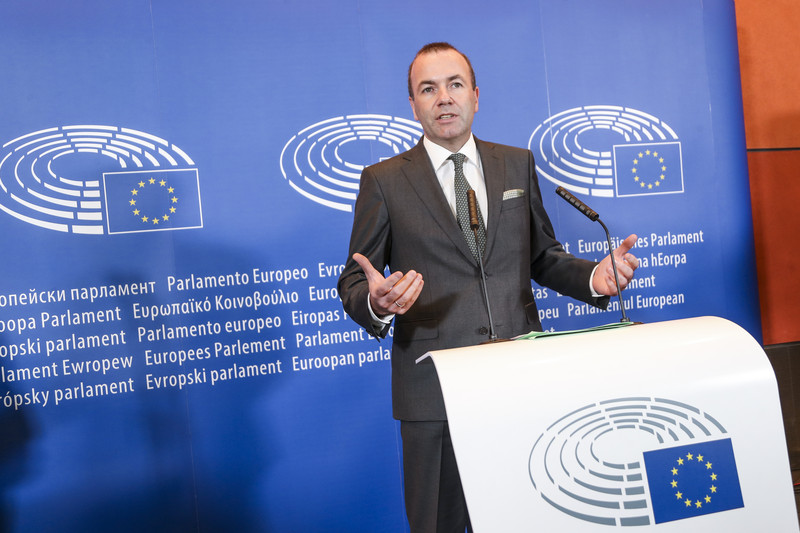EurActiv (25 April 2019)
As the European elections are approaching, EURACTIV takes a closer look at what candidates and their parties are saying ahead of the polls to help you separate facts from fiction.
With his Renaissance list, France’s Emmanuel Macron aims to shake up the political scene in the new European Parliament. EURACTIV examines the accuracy of the campaign’s interpretation of EU electoral rules.
In early March, the French president called for a “European Renaissance” with an open letter addressed directly to the “citizens of Europe”, published in newspapers in all 28 EU member states.
Macron makes EU-wide appeal 'for European renewal'
French President Emmanuel Macron made an appeal to all Europeans on Monday (4 March) to re-launch the EU project by holding a conference “without taboos” before year’s end that could possibly lead to a new treaty.
On Wednesday (24 April), Macron’s La République en Marche (LREM), whose campaign is dubbed Renaissance announced the complete the list of 79 candidatesrunning for the European elections in France.
According to the latest projections, LREM could win around 20-22 MEPs of the country’s 74* seats in the next European Parliament and appears to be slightly ahead of Marine Le Pen’s anti-immigration, far-right Rassemblement National.
LREM has repeatedly said that an alliance with the liberal ALDE group in the European Parliament might not be necessary, despite obvious affinities between the two.
Instead, ideas have been floated of forming an ad hoc coalition after the May elections rather than joining an existing group in the assembly.
What is the issue?
Macron’s Renaissance list, made up of LREM and a loose alliance/coalition of other French parties and movements, now also carries candidates from seven EU countries (with double nationality) to reflect “a transnational ambition”, the Renaissancecampaign announced on their website:
“Seven European nationalities are represented on the Renaissance list. Seven is the number of nationalities needed to create a political group in the European Parliament. Nationals from France, Greece, Portugal, Italy, Germany, Hungary and Belgium, all of whom have chosen to live in France, are united on our list for European Renaissance.”
It is seen as a prequel to the creation of a new political grouping in the next Parliament.
What are the stakes?
Putting aside the symbolism of LREM’s decision, however, most of the non-French candidates are placed below a realistic threshold anyway.
But while the idea does contain bits of truth, the assertion is nevertheless misleading.
As with everything in the European election process, such a step needs to follow an institutional process.
The Rules of Procedure of the European Parliament lay down the minimum criteria for a political group to be formally recognised as such in the hemicycle.
Rule 30 thus states that elected members may form groups according to their political affinities. However, it specifies:
“A political group shall comprise Members elected in at least one-quarter of the Member States. The minimum number of Members required to form a political group shall be twenty-five.”
Although the candidates on the Renaissance list might include nationals of seven different European member states, the French campaign may have misinterpreted the criteria.
“Parliament’s Rules of Procedure are pretty clear on this,” a European Parliament spokesperson told EURACTIV:
“It is not a question of nationality, but of country of election, and of being elected. A Group would need MEPs elected in at least seven different member states.”
“If the candidates from seven different countries and standing in those countries are indeed elected (and they are 25 or more), then, but only then, indeed would they be able to form a group on their own.”
What can be concluded?
Macron, it seems, most probably will not be able to avoid reaching out to like-minded parties around Europe if he wants to form his own grouping in the next European Parliament and have significant influence.
If, in the end, he does go for an alliance with the Liberals from ALDE, the group could become kingmakers in efforts to form a possible majority in the chamber.
No comments yet.
- ONLY FOUR OUT OF TEN FRENCH PEOPLE CAN NAME TOP EU PARLIAMENT CANDIDATES Europe - EU 26.04.2019
- SENIOR CPC OFFICIAL MEETS KYRGYZ PRESIDENT Central Asia 26.04.2019
- LESS THAN HALF OF BRITS, CZECHS AND ITALIANS WOULD VOTE TO REMAIN IN THE EU Europe - EU 26.04.2019
- US MILITARY, ALLIES IN ROMANIA STAGE LARGEST-EVER COMBINED NATO MEDICAL EXERCISE The Balkans 26.04.2019
-
 WEBER VOWS TO BLOCK NORD STREAM 2 AMID 'SUE' THREAT
Europe - EU
26.04.2019
WEBER VOWS TO BLOCK NORD STREAM 2 AMID 'SUE' THREAT
Europe - EU
26.04.2019
-
25.01.2016
THE ARMENIAN QUESTION - BASIC KNOWLEDGE AND DOCUMENTATION -
12.06.2024
THE TRUTH WILL OUT -
27.03.2023
RADİKAL ERMENİ UNSURLARCA GERÇEKLEŞTİRİLEN MEZALİMLER VE VANDALİZM -
17.03.2023
PATRIOTISM PERVERTED -
23.02.2023
MEN ARE LIKE THAT -
03.02.2023
BAKÜ-TİFLİS-CEYHAN BORU HATTININ YAŞANAN TARİHİ -
16.12.2022
INTERNATIONAL SCHOLARS ON THE EVENTS OF 1915 -
07.12.2022
FAKE PHOTOS AND THE ARMENIAN PROPAGANDA -
07.12.2022
ERMENİ PROPAGANDASI VE SAHTE RESİMLER -
01.01.2022
A Letter From Japan - Strategically Mum: The Silence of the Armenians -
01.01.2022
Japonya'dan Bir Mektup - Stratejik Suskunluk: Ermenilerin Sessizliği -
03.06.2020
Anastas Mikoyan: Confessions of an Armenian Bolshevik -
08.04.2020
Sovyet Sonrası Ukrayna’da Devlet, Toplum ve Siyaset - Değişen Dinamikler, Dönüşen Kimlikler -
12.06.2018
Ermeni Sorunuyla İlgili İngiliz Belgeleri (1912-1923) - British Documents on Armenian Question (1912-1923) -
02.12.2016
Turkish-Russian Academics: A Historical Study on the Caucasus -
01.07.2016
Gürcistan'daki Müslüman Topluluklar: Azınlık Hakları, Kimlik, Siyaset -
10.03.2016
Armenian Diaspora: Diaspora, State and the Imagination of the Republic of Armenia -
24.01.2016
ERMENİ SORUNU - TEMEL BİLGİ VE BELGELER (2. BASKI)
-
AVİM Conference Hall 24.01.2023
CONFERENCE TITLED “HUNGARY’S PERSPECTIVES ON THE TURKIC WORLD"









